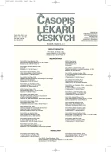Possibility of using the determination of minimal residual disease in pancreatic adenocarcinoma using real-time RT-PCR – a pilot study
Authors:
Dušan Klos 1; Martin Loveček 1; Josef Srovnal 2; Andrea Benedíková 2; Věra Růžková 2; Lenka Radová 2; Marián Hajdúch 2; Čestmír Neoral 1; Roman Havlík 1
Authors‘ workplace:
Univerzita Palackého v Olomouci, Lékařská fakulta, I. chirurgická klinika FN
1; Univerzita Palackého v Olomouci, Lékařská fakulta, Dětská klinika FN, Laboratoř experimentální medicíny
2
Published in:
Čas. Lék. čes. 2010; 149: 69-73
Category:
Original Article
Overview
Background.
Minimal residual disease in patients with pancreatic cancer is defined as the presence of isolated tumor cells in the patient’s body, in which the primary tumor was removed and is currently without clinical signs of disease. These isolated tumor cells may be described as precursors of micrometastases. Assessment of MRD in patients with this highly malignant disease could eliminate burdensome implementation of surgery in patients with systematic dissemination of molecular disease and provide a more precise prognosis.
Methods and results.
The study to date included 70 patients operated on with curative intent for carcinoma of the pancreas. Samples of peripheral and portal blood, bone marrow, peritoneal lavage and of the tumor itself were analyzed by real-time PCR which measured the expression of hTERT (telomerase), EGFR1 (receptor for epidermal growth factor) and CEA (carcinoembryonic antigen). The expression of these markers was correlated with clinicopathological characteristics and survival parameters. We found a statistically significant association between EGFR expression levels in the portal blood and clinical stage – patients with advanced disease have a higher expression of EGFR in the portal stream and peritoneal lavage in contrast to patients without the presence of metastases.
Conclusions.
The results of this pilot study demonstrated a high sensitivity and specificity of the RT-PCR method for detecting circulating tumor cells in patients with pancreatic cancer. By utilizing this methodology, we are able to provide prognostic value of minimal residual disease and its significance for the indication of radical surgery for pancreatic cancer.
Key words:
pancreatic cancer, minimal residual disease, real-time RT-PCR method, predictive factors.
Sources
1. Adam Z, Vorlíček J, Vaníček J, et al. Diagnostické a léčebné postupy u maligních chorob. Praha: Grada Publishing 2002.
2. Koch M, et al. Detection of Hematogenous Tumor Cell Dissemination Predicts Tumor Relapse in Patients Undergoing Surgical Resection of Colorectal Liver Metastases. Annals of Surgery 2005; 241(2): 199–205.
3. Niedergethmann M, Rexin M, Hildenbrand R, et al. Prognostic implications of routine, immunohistochemical, and molecular staging in resectable pancreatic adenocarcinoma. Am J Surg Pathol 2002; 26(12): 1578–1587.
4. Schuster R, Max N, Mann B, et al. Quantitative real-time RT‑PCR for detection of disseminated tumor cells in blood of patients with colorectal cancer using different mRNA markers. Int. J Cancer 2004; 108 : 219–227.
5. Taniguchi T, Makino M, Suzuki K, Kaibara N. Prognostic significance of reverse transcriptase-polymerase chain reaction measurement of carcinoembryonic antigen mRNA levels in tumor drainage blood and peripheral blood of patients with colorectal carcinoma. American Cancer Society 2000; 89(5): 970–976.
6. Tamagawa E, Ueda M, Takahashi S, et al. Pancreatic lymph nodal and plexus micrometastases detected by enriched polymerase chain reaction and nonradioisotopic single-strand conformation polymorphism analysis: a new predictive factor for recurrent pancreatic carcinoma. Clin Cancer Res 1997; 3(11): 2143–2149.
7. Soeth E, Grigoleit U, Moellmann B, et al. Detection of tumor cell dissemination in pancreatic ductal carcinoma patients by CK 20 RT-PCR indicates poor survival. J Cancer Res Clin Oncol 2005; 131(10): 669–676.
8. Broll R, Weschta M, Windhoevel U, et al. Prognostic significance of free gastrointestinal tumor cells in peritoneal lavage detected by immunocytochemistry and polymerase chain reaction. Langenbecks Arch Surg 2001; 386(4): 285–292.
9. Soeth E, et al. Detection of tumor cell dissemination in pancreatic ductal carcinoma patiens by CK 20 RT-PCR indicates poop survival. J Cancer Res Clin Oncol 2005; 10 : 669–676.
10. Hoffmann K, et al. Detection of disseminated pancreatic cells by amplification of cytokeratin-19 with quantitative RT-PCR in blood, bone marrow and peritoneal Lavre of pancreatic carcinoma patiens. World J Gastroenterol 2007; 2 : 257–263.
Labels
Addictology Allergology and clinical immunology Angiology Audiology Clinical biochemistry Dermatology & STDs Paediatric gastroenterology Paediatric surgery Paediatric cardiology Paediatric neurology Paediatric ENT Paediatric psychiatry Paediatric rheumatology Diabetology Pharmacy Vascular surgery Pain management Dental HygienistArticle was published in
Journal of Czech Physicians

- Advances in the Treatment of Myasthenia Gravis on the Horizon
- Possibilities of Using Metamizole in the Treatment of Acute Primary Headaches
- Metamizole at a Glance and in Practice – Effective Non-Opioid Analgesic for All Ages
- Metamizole vs. Tramadol in Postoperative Analgesia
- Spasmolytic Effect of Metamizole
-
All articles in this issue
- Renin, prorenin, and the direct renin inhibitor aliskiren
- Computed tomography laser mammography
- Possibility of using the determination of minimal residual disease in pancreatic adenocarcinoma using real-time RT-PCR – a pilot study
- What to advise children of addicted parents
- Infrared pupilometry as a biomarker of drug effects
- Journal of Czech Physicians
- Journal archive
- Current issue
- About the journal
Most read in this issue
- Infrared pupilometry as a biomarker of drug effects
- Renin, prorenin, and the direct renin inhibitor aliskiren
- Computed tomography laser mammography
- What to advise children of addicted parents
